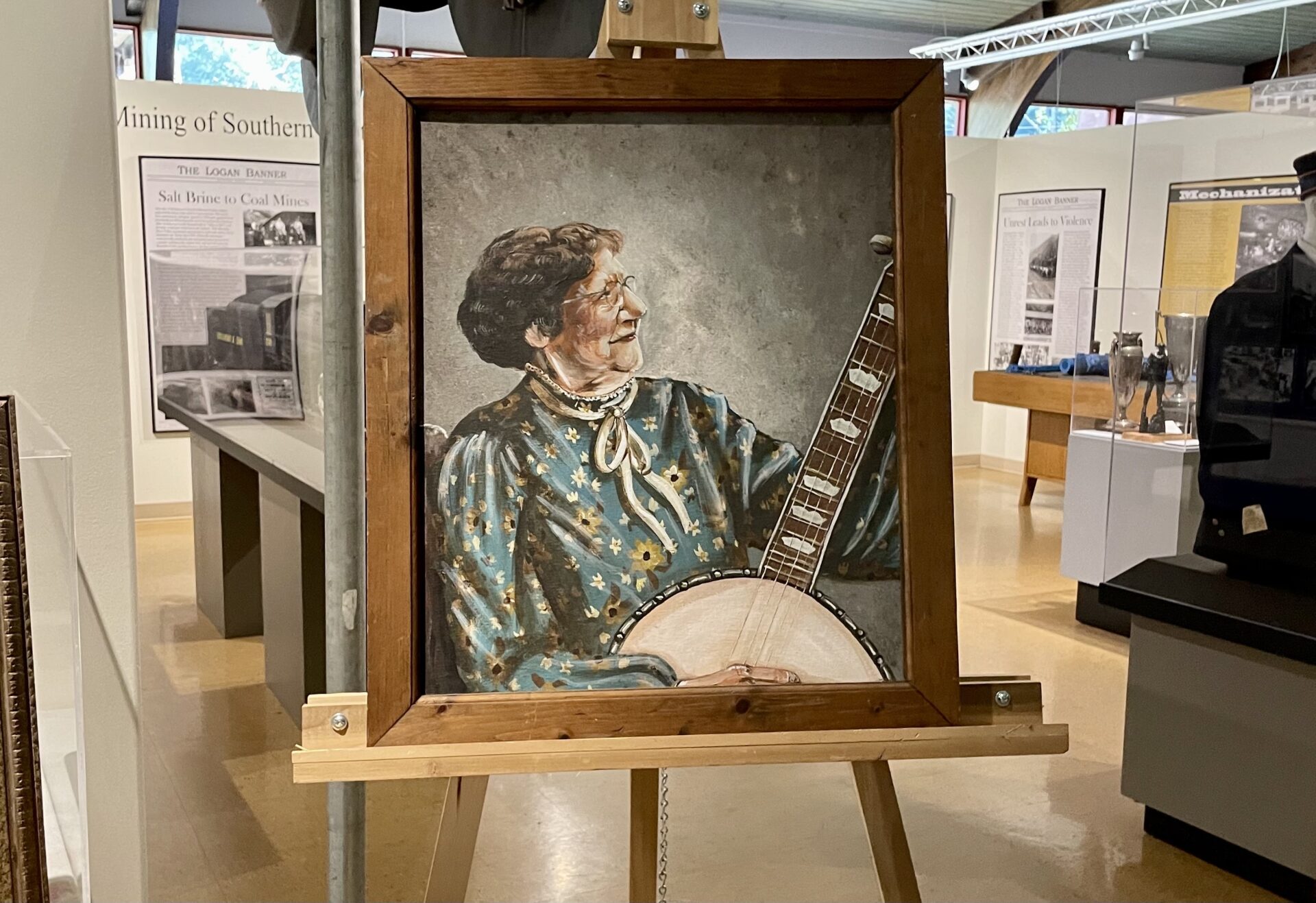Aunt Jeanie Wilson was usually playing her banjo somewhere along the road in Logan County, surrounded by a crowd of neighbors.
Her granddaughter Beverly Smith was part of that crowd as a young girl. Recently, at the age of 73, she stood with dignitaries in Chief Logan State Park for the unveiling of the Aunt Jeanie Wilson Legends of Lore sign.
Smith said, while growing up, her grandmother’s house was like a never-ending holiday, where friends and family were always coming and going.
“Her door was open to anyone,” Smith said. “The kids that grew up down there, where we lived on Crooked Creek, would hear her music play. And she would be on her front porch in the swing, playing her banjo. You would hear the music all over the neighborhood. She invited all these artists and different people to come and sit on the front porch and play with her anytime they wanted to.”
Credit: Briana Heaney/West Virginia Public Broadcasting
Smith grew up singing and dancing along to her grandmother’s music. She said anywhere Wilson played there would be a crowd.
Roots of Blues
Wilson played old mountain music — which predates bluegrass music. Old mountain music is a blend of Scottish and English ballads and African Dance and hymnal music from the enslaved African people.
The Claw hammer style of playing originates from enslaved African American musicians who made the earliest banjos out of hollowed out gourds with animal hyde as strings.
Credit: Briana Heaney/West Virginia Public Broadcasting
The music was distinctive of early southern Appalachian mountain music. It’s different from a bluegrass banjo style, where the strumming hand of the player is pulling upward.
Claw hammer got its name from the claw-like shape the player makes with their strumming hand while playing. The banjo player strums downward, often using the tips of their fingers and nails.
“She always just used your fingernails and she trimmed up like you would for a harp. It was a very unique style,” Smith said.
West Virginia Woman
Friends said Wilson was a mountain woman through and through. She would hike up into the mountains to find poke and creasy greens, and mushrooms to feed her family. She was a sharpshooter with a shotgun and hosted big dinners at her house every Sunday.
Bobby Taylor met Wilson at the 1950 Mountain State Art and Craft Fair in Ripley, where Wilson had become a regular. They played together often after meeting.
“She just did what was pure and old from the mountains,” Taylor said. “I always considered her tops as far as the heritage,and the music. She had the most beautiful right hand on the banjo, smooth as a ribbon.”
Credit: Briana Heaney/West Virginia Public Broadcasting
West Virginia Suffering
Wilson married at age 18, and had four children with her husband James Dewey Wilson. In 1939 she lost her seven-year-old child to pneumonia and later that year her husband died in a coal mining accident.
“You had to suffer to be able to play the music and have the feeling and soul in it like she had. There’s real feeling and real soul,” Taylor said.
He said her understanding of pain and true sadness is what made her such an enlightened musician.
“People that really suffered. You can feel the chill in the music. All of that comes through. The sorrow, the pain — but also the good times. The light, the dancing. It’s beautiful,” Taylor said.
Legend and Lore
Wilson went on to play for Ronald Reagan in the White House, and often played for Arch Moore, the former governor, who wrote her letters from prison after he was convicted for mail and tax fraud, according to her grandchildren.
Smith said Wilson changed her political affiliation from Democrat to Republican after meeting Ronald Reagan.
Credit: Briana Heaney/West Virginia Public Broadcasting
She became a fixture at festivals around the state, appeared on the show “Real People.”.
Wilson died at age 92 at Logan General Hospital. Her family members said she was playing the banjo with friends and family up until her last days.
Now, nestled in Chief Logan State Park sits Aunt Jeanie Wilson’s legends and lore marker.
The marker was created with help from Logan County Chamber of Commerce, West Virginia State Parks, the National Coal Heritage Authority, and the West Virginia Folklife program at the West Virginia Humanities Council.
